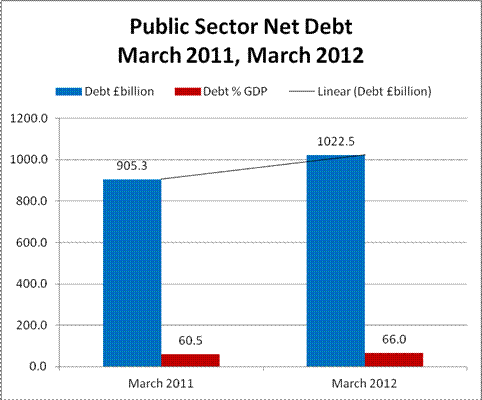
This talk was given 10 May 2012
The text here may not be identical to the spoken text
BUILDING SOCIETIES ASSOCIATION 10 MAY 2012
MANCHESTER CENTRAL
We
have heard about business from John Cridland and about economics from Robert
Parker.
I
am here as a freelance financial journalist who has been writing and
broadcasting about money for 40 years and earning all my living doing that for
more than a quarter of a century. I am not here representing MoneyBox or god
forbid the BBC nor Saga Magazine who I also work for.
In
all that time I have had one clear point of view. The point of view of what we
generally call consumers – but I mean your customers the people who walk into
your branches or log onto your websites – and give you your living.
So
the state of my nation is not the Government’s deficit or its growing debt – now
above £1 trillion again.
Though I will point out that despite all the cuts and the austerity we are not
paying off the nation’s credit card.
Here is the public sector net debt now and a year ago rising in both pounds and

Nor
is my state of the nation the economy in recession.
I
would have a slide here but a bar chart of -0.3% is quite hard to see.
No.
My focus is the state of the people in the nation – consumers, if you like.
Customers if you prefer.
And
they are caught between two things – the economic realities which are bad. And
the political choices which the Coalition government has made to deal with them.
Now
I don’t propose to discuss whether those choices are right or wrong, the best or
the worst, or indeed whether they will work – however that might be measured –
or not. I propose to look at their effects and what that means for your
business.
And
to me pure building society business is simple. You take in money from savers,
pay them for the use of it through an interest rate, and lend it out to
borrowers – principally to buy a home – at a higher cost, with a margin that is
enough to make your living, pay your staff, deal with bad debts and of course
crucially not pay a dividend to shareholders.
Now
you all know that. And you all know, especially the bigger ones, that you stray
from that. But I say them to you because when I was here a few years ago things
were very different. Ten building societies had decided that their future lay
not as a building society but as a bank. And they either converted or sold
themselves to banks – merged with was the phrase used – in the great
demutualisation experiment.
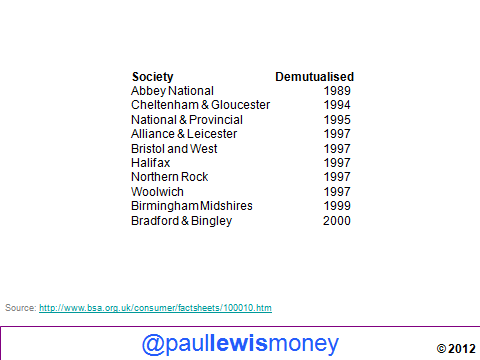
It
failed. Every single one of those societies has lost its identity – either
disappeared into a bank or gone bust or in one case both – and two now owned
largely by the state. Such was the success of the demutualisation programme. I
am proud that, almost alone among financial journalists, I was a demutualisation
sceptic throughout the nineties and the early 2000s before it began to unravel.
Not
because of any pro-mutual principle. But because the arithmetic said that the
conversion from mutual to bank could not work because there was another player
who had to take money out of the business – shareholders leaving less for
everyone else. And all that stuff about PLCs being more efficient and driving
down costs was of course nonsense.
Indeed, what we didn’t know then was that there would be another growing drain
on the resources of banks. Executive pay. The people at the top of the banks now
pay themselves – what? five or ten times the amount that even the best paid
people who run building societies get.
So
with those two big advantages over the banks – no shareholders and executive pay
that is not out of control – you are perfectly placed to challenge them.
So
let me look at the state of the nation in those two areas where you trade –
savings and lending.
Savings
Savings first. Because without that money you’ve nothing to lend it out. In the
pure model. I know you don’t always do that.
Let
me tell you a story. I decided to open my 2012/13 cash ISA last week. And where
did I go? Cheshire Building Society. Was it because I like building societies?
No. Last year I put my new ISA money with the AA for heaven’s sake. No, it was
because it was the highest rate – 3.5% instant access. No conditions. So
Cheshire has my money. Or some of it.
What about that money I had with the AA? And another ISA with Halifax? That’s
looking for a new home. Because both those deals have collapsed to a low rate.
AA is now 1.7% and Halifax, though it didn’t actually tell me this clearly, is
now a pathetic 0.1%. So is this money with the Cheshire as well? To lend to
footballers in Wilmslow who find it more tax efficient to buy their homes on a
mortgage? No. Cheshire didn’t want it. They only want new money – footballers
again! – old money like mine not interested.
But
hang on a minute, you can transfer another ISA to a Cheshire ISA – its Instant
Access Cash ISA would love to take your money. But it pays a slightly different
rate. Not 3.5% but 0.5%. So on £5000 instead of paying me £175 for the use of my
money it would pay me just £25. For £5000. For a year. Who in their right mind
would accept that? Well lots do.
Leaving the Cheshire cat grinning from ear to ear – like its namesake.

And
what about my 2012/13 money? Will Cheshire want that next year? No. By October
next year my 3.5% return will plummet to just 1% – paying me just fifty quid a
year for the use of my five grand.
So
where is my previous year’s money? From AA and Halifax? Back to
www.savingschampion.co.uk – which let any deals it has with the firms in its
tables affect their position.
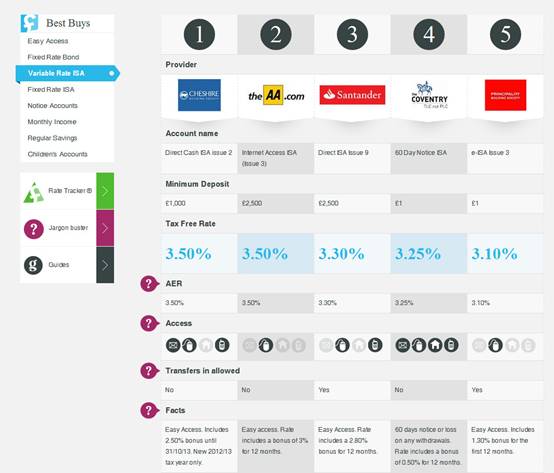
The
top paying cash ISA which accepts new money and has no hidden traps is
Santander. So mine is being moved there. Yes. I did choose the second most
complained about bank for banking services, according to FSA complaints data
2011. Largely because I don’t expect to
contact the bank at all during the time it has my money. It will only be there
for a year because, yes, 12 months after I opened it my money will start earning
the rubbish rate of 0.5%.
So
there is a note in my diary in big Santander red type ‘move my cash ISA from
Santander’. And if I do need to take any money out in the meantime I can do that
online without talking to anyone or paying to call Santander’s 0870 customer
profitline.
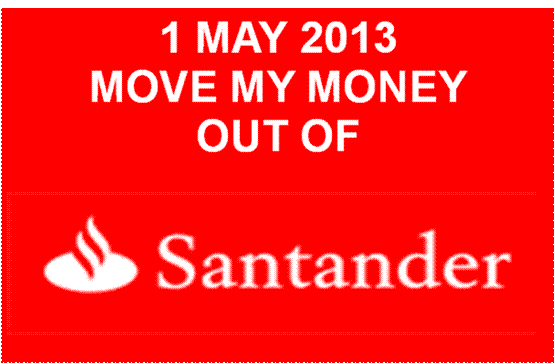
I
say all this not have a go at Cheshire B Soc or its massive parent Nationwide.
You all do it. And we all know why. If you offered the real rate that you could
afford – 2%, bit more perhaps – then the banks would take all the cash savings.
So you have to do what they do.
But
it is a pretty poor business model isn’t it? You tempt people in with an
unsustainable offer, then you sit back and keep quiet and hope they won’t notice
when you turn a table topping offer into a one below the top hundred.
I
have spent so long on this not to tell you anything you don’t know. But for two
related reasons.
First, to let you know that among all the complaints I get about savings the
relatively poor rates are top of the list. But the fact that you have to work so
hard to find the best deals – not just once but every year or indeed every six
months if you really want to get the best return on your cash.
And
the great unfairness of this is to those who don’t move their money. It’s all
right for me and many listeners and tweeps who know where to go, who know the
traps to look out for, who understand the rules, who have cheap, fast access to
the internet and the confidence to trust their money to it. But every time I
move my money and get 1 or 1.5 percentage points above what you can really
afford to pay, someone else gets 1 or 1.5 percentage points less. So the – what
shall I call them – the astute – profit at the expense of the rest.
So
I probably feel no prouder of doing that with my money than you do with making
these unsustainable offers. We are both trapped by the system.
My
second reason for mentioning it is to ask you if there is a better way? A
building society way?
And
you may have to find one.
Over the last few weeks I have had lunch with executives from a number of banks
and building societies. And every single one of them, when I have raised the
complaints about rates plunging twelve months after an account is opened, every
one has said to me with a note of pride “Oh but we tell customers now when the
interest rate is about to fall.”
And
how crestfallen they have looked when I have reminded them that they do that
because it is the law. The Payment Services Regulations 2009 say they – you –
must. So you do. And don’t think smugly to yourself ‘we did it before that law
came in’. You knew it was on the way.
And
if that law changes behaviour and there are fewer suckers to leave their money
languishing with you at a fiver a year for every five grand you borrow off them
then you will all have to change. And pay people a more affordable rate.
Think on – as they say in this part of the world – think on. And I say that
partly because I was born near here and practising for my twice weekly
appearances on BBC Breakfast live from Salford.
Even with the loss leader rates that savers can get another common complaint is
‘my savings don’t keep up with inflation’.
I
have never understood that complaint.
There are two reasons to save. One is to live off the income. And people who do
that can reasonably complain that they the 3% they struggle to earn – before tax
– is a fraction of what it used to be and of course if they are not active
savers they will be getting 0.1% or 0.5%.
The
other is to save up for something. Now for most consumer goods that is not very
common – people tend to borrow to buy the plasma TV or the new kitchen. And even
if they do save they are not really saving long enough to worry about the
interest earned.
The
most common reason to save is for the deposit on a house. Now house prices are
falling. So as your money grows by 3% a year the property you are chasing is
falling in value – in some parts of the country by 3%. So even a fixed £10,000
in the bank becomes a bigger proportion of the home you want to buy. So it
doesn’t matter what general inflation is. What matters is that you (a) save and
(b) chase the rates.
Mis-selling or Fraud?
Let
me take you to another state of the nation at the moment. Mis-selling.
I
tweet a lot nowadays – @paullewismoney it’s a personal account, not a BBC
account, not ‘complied’ as they call it, so I say what I want within the bounds
of libel and usually commonsense. It has around 31,200 followers – if it was a
magazine with that circulation it would be between
Grand Designs and
Angler’s Mail. I rather like that
thought.

I
can’t offer you a preview of the Carp Show. But I do tweet often about mis-selling.
And I get a surprising number of people who tweet back – from the consumer point
of view – saying ‘what is this mis-selling? Is it just you media protecting the
banks? Surely mis-selling is just a polite word for fraud?’
When I do tweet about mis-selling the spellchecker on the iPad converts it to ‘mis-spelling’.
It may have a point. We should have said the Arch Cru investment was high risk
but we mis-spelled the word ‘high’ L-O-W. And by mistake left out the word
‘extremely’. Proof-reading errors. No more.
But
what about fraud?
Fraud is committed if I lie to you and as a result you give me money.
But
the law goes a bit broader.
First – it is not only lying at the heart of fraud. Anything said which the
person saying it knows to be untrue or misleading which causes the person who
hears it suffer a loss or a risk of loss, is fraud.
Fraud is also committed by failing to disclose information which you have a
legal duty to disclose, and that causes you to profit or the other person to
make a loss.
And
there is also fraud by abuse of position. If you are in a position where you are
expected to safeguard or not to act against the financial interests of another
person and you abuse it by acting or failing to act and you gain or the other
loses.
That was from the Fraud Act 2006 and I recommend sections 2, 3, and 4 to you for
your bedtime reading. It’s one of the shorter simpler Acts of Parliament. And,
as I said earlier, think on.
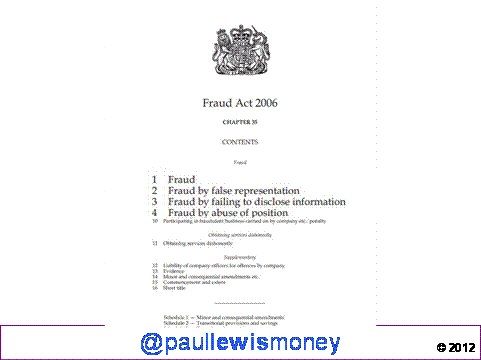
http://www.legislation.gov.uk/ukpga/2006/35/contents
Mis-selling
is in our minds at the moment. In the last two weeks Barclays, HSBC, Lloyds, and
RBS have set aside an extra £1 billion this quarter to pay compensation for
Payment Protection Insurance mis-selling. That brings the total amount set aside
for the big five banks to more than £7 billion. The final total for all banks,
building societies and smaller lenders could well be more than the £8 billion
predicted a little while ago.
|
PPI PROVISIONS BY BIG FIVE BANKS |
|||
|
2011 |
2012 Q1 |
Total |
|
|
£million |
£million |
£million |
|
|
Lloyds |
£3,200 |
£375 |
£3,575 |
|
RBS |
£1,075 |
£125 |
£1,200 |
|
Barclays |
£1,000 |
£300 |
£1,300 |
|
Santander |
£538 |
£0 |
£538 |
|
HSBC |
£455 |
£290 |
£745 |
|
TOTAL |
£6,268 |
£1,090 |
£7,358 |
Individual amounts are significant – the average is now said by ING to be around
£2600 and it reckons £5.6 billion will be paid out to more than 2 million people
this year. It really is the High Street bank version of quantitative easing.
Pumping new money into the economy.
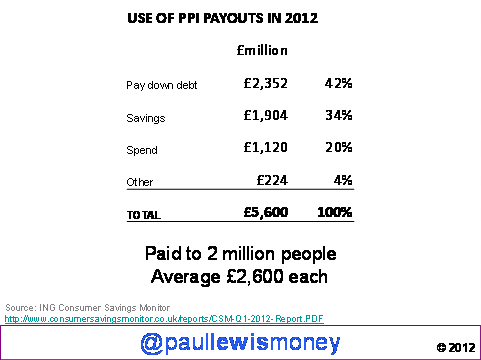
The
ING research estimates that more than £1bn will be spent on the High Street.
Another £1.9 billion will go into savings accounts. And £2.4 billion will be
used to pay down debt. Which will also release spending power.
Now
I have stood on platforms like this for some years saying that PPI was a waste
of money and was widely mis-sold. And as time has passed the response has
changed from boos to murmurs to silence to the rustling of paper to, now, sage
nods. ‘Oh yes it was widely mis-sold and do you know we are making every effort
to repay it?’ Forgetting to mention that it was only eighteen months ago that
the major banks put all claims on hold pending the court case which they hoped
to win. Only when they lost did they suddenly realise what the law said and what
they had to do.
And
was this systematic mis-selling of unnecessary and unclaimable insurance, in
fact fraud? Giving information known to be untrue or misleading, omitting
information that there is a legal duty to disclose, being in a position where
you should safeguard another’s financial interests and failing to do so – any of
those to make a profit is fraud.
The
more I look into it the more I tend to agree with those tweeps. It goes beyond
mis-selling. There is a respectable legal argument that it was fraud. And on an
industrial scale.
I
put this little interlude in because I will return to mis-selling later.
Lending
But
next – what you do best – lending.
Let
me tell you first what listeners, viewers, and tweeps say to me about the
process now in 2012 of getting a loan to buy a house. A mortgage.
You
need a perfect credit record. If a
customer was on holiday and had a late payment charge on a credit card, or
forgot to pay a mobile phone bill, or argued about a loan repayment and was late
with it, or moved a lot and has not always been on the electoral roll – then
they say they are automatically refused a mortgage. Now I am sure you will say
‘no, no, no. Not true of us’. But I do ask you to be realistic about the real
credit risk of someone who has been late with a couple of payments.
To
get the best deals you need a big
deposit. 10% is good, 15% better 25% pretty perfect. That can cut your rate
by nearly 2 percentage points – cutting monthly payments for the same loan by
£100 or more. So do look at the differential prices between big deposits and
more realistic ones. Building societies are there not to help the rich but to
help the ordinary person or couple buy a home.
And
saving up for that deposit is difficult. Not least because if you are renting
rents are high and of course you get little or no help from the rate of return
on your savings. At least you might hope over the time you are saving the
interest might pay the stamp duty. But that is unlikely now.
Though as I said earlier with falling
house prices your savings are worth a bigger proportion of the price of your
target home.
And
finally house prices themselves. In
many parts of the country buying your first property is impossible on average
pay. Though, it has be said, that in some parts it is possible.
Now
I said earlier I am not an economist. And I’m not. But there is one economic law
that is self-evidently true. Often called the law of supply and demand. If there
is a shortage of a product the price goes up. If there is a surplus the price
goes down. So if the supply does not meet the demand then prices must go up. I
have been known to say that this is the only economic law that always works. It
is an iron law, the e=mc2 of economics.
But
with property we have a strange situation. There is a shortage of property.
Every report into the supply of property from family formation, immigration, and
the choice we want to make of living alone shows us that we need to build
perhaps 250,000 homes a year yet we are building barely 100,000. So there is a
shortage of homes – and that affects the rental market as well as the purchase
market. It should be putting up prices. But if we look at house prices in the UK
as a whole they are pretty flat. In places falling, in others rising. Because it
is not enough just to want a home of your own – you have to have the means to
buy it.
And
let me be clear about home ownership. In the UK as in most of Europe buying a
home is the most sensible option. First, it gives you security in old age. If
you rent then when you retire and your income falls you will have to move to
somewhere you can afford – which you may not want to do.
Second, it gives you a home in a way that rental cannot. At least not in the UK.
Not now. Buy to let created a whole new form of tenancy – assured shorthold.
Where the only thing assured for the tenant was that after six months they could
be asked to move at two months notice. The landlord needs no reason and it has
happened out of the blue for many people living near the Olympics site for
example. In other words shorthold tenancies are fine for young people not
settling down looking for somewhere to camp for a short time. But it is not
suitable for a person who wants to settle down in an area or have a family. But
for fifteen years every new tenancy has automatically been an assured shorthold
tenancy.
No
surprise then that rents rise rapidly to the highest level enough people can
pay. It is a scheme designed for the convenience of landlords – particularly of
course the new market (I say ‘new’ in a historical context) of buy to let.
Lenders will only lend for buy-to-let if the letting is an assured shorthold
tenancy.
There is an alternative – an assured tenancy where you can only be evicted for a
tenancy offence – not paying your rent for example. If you lent on buy to let
for those tenancies as well – or indeed on ethical grounds only on those
tenancies – then life would be a lot better for many tenants.
So
until we have a more balanced rental sector – balancing the rights of tenants
and landlords more evenly – then buying a home is a sensible thing to do. Hence
the desire to do so.
I
explained earlier the barriers that were being put in the way of aspiring home
owners. And it is the balance between these two competing forces that keeps
house prices in a rather unstable stability. In London and the southeast of
England things are a bit different. There estate agents tell me prices are high
and rising because there are many buyers with cash – many from overseas – and
perhaps more now after the French and Greek elections – wealthy people with cash
to buy in a strong, desirable and finite market. So prices rise. In other places
where the economy is declining, work is disappearing, and prices are falling as
demand moves elsewhere. And some of that demand of course comes from buy-to-let
landlords.
Now
in some ways the price of a house doesn’t matter if you already have one. I
don’t care if my house is worth £5, £500,000, or £5 million. It is still worth
one house. And when I want to move I shall sell it for the price of one house
and use that money buy another which will also be worth one house.
That is not how houses have been seen though. In the long period of house price
inflation a house has been seen as an investment, as a piggy bank, as a pension
– sometimes all three. Indeed we even had pension mortgages at one time.
But
for some groups the price of a house does matter. Those who don’t have one are
very affected by the price of entry to the market. Those who have more than one
do get very concerned about what that strictly unnecessary home is worth. And
then there are the four million with interest only mortgages.
I
have often said that endowment mortgages – when interest only was invented – was
mis-selling. All of it. You were selling a certain debt of known amount due to
be repaid at a fixed time and also selling to repay it an investment whose value
would go up and down and was not guaranteed to meet the certain debt at the
fixed time. They were mis-sold because they claimed to offer a certainty that
the endowment policy would provide sufficient to repay the loan and extra to
give you a lump-sum as well.
So
imagine what I think about interest only mortgages with no repayment vehicle in
place.
Of
course they can seem like a good idea. Because there is no capital repayment the
monthly payments are lower. So for a fixed budget you can buy a bigger place.
And at the end of the loan – twenty five years – of course the price of property
will have increased and you can use that profit to buy yourself a smaller home
for your retirement. And if at some point you need to buy somewhere else then
wages keep on going up don’t they – so with capital gain and higher pay you will
be able to replace it.
And
now we see the problem. Interest only loans were predicated on rising house
prices and rising pay. If either or both of them fail to do that then it is a
less sensible option. At the end or in the middle of the loan you could have no
equity in the home – or no more than your deposit – so you will not be able to
buy somewhere else. And of course you will be older and may not have another 25
years to buy somewhere. After 25 years of paying the interest on a loan you may
have no equity, no home, and no means of borrowing more. So rising house prices
are crucial to the interest only borrowers.
The
question is, were these loans mis-sold or mis-bought?
I
don’t know the answer to that question. People with these mortgages have said to
me that they went into it with their eyes open that they were the only way to
achieve what they wanted they were perfectly happy with their home thank you
very much. And what happens at the end? Oh, something will turn up.
Ah,
Wilkins Micawber right on cue.

But
the banks did not think that they were mis-selling PPI. 795 IFAs did not think
they were mis-selling investments in Arch Cru recently – and now have to find
£110 million to compensate them – about a third will go bust as a result. And in
the first mis-selling scandal – for which the word mis-selling was actually
invented along with the modern financial services industry in the early 1990s –
the pensions mis-selling scandal – I doubt if the thousands of commission driven
sales staff who mis-sold £11.5 billion of pensions thought they were doing
anything wrong either.
So
be prepared.
And
let me tell you how to protect yourself against mis-selling in the future. It’s
dead easy.
End
commission. Something else I have been banging on about for years. And like many
other things – PPI, regulating products not sales – I have been proved right and
my views have become mainstream. It is going for investment products from
January. But it will remain for insurance products – which is why many IFAs are
switching to selling those. And the FSA made it clear in December that it would
not be banning commission in the sale of mortgage products.
Commission is the driving force which leads to misrepresentation – which drives
the salesperson to put their own interest ahead of their client’s. And what does
misrepresentation mean – fraud.
My
final message to you is get rid of commission.
Think on.
Thank you.